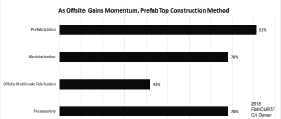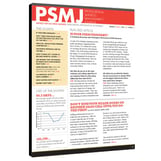
Ask the average person their opinion of prefabricated houses and you're likely to get a skeptical look. "A lot of people picture a mobile home being transported on the back of a flatbed truck," says Meelena Turkel. "It's a misconception we deal with all the time, but that doesn't dissuade us from designing and building the highest-quality homes we can."
She speaks from experience: She and her husband Joel own and operate Turkel Design, a Boston-based residential design and building firm that, in their words, “leverages the predictability of pre-fabrication to deliver a high-quality home and beautiful contemporary design to our clients."

The Turkels didn't go looking for a market niche when they went into business; you could say it found them. The couple met at Massachusetts Institute of Technology; both wrote their theses on prefabrication, an area of long-time research at the school. Since its launch in 2008, Turkel Design has built over 100 homes in the U.S. and Canada, continually refining what it called its "systemized building" approach to making design and construction as simple as possible.
PREDICTABLE DESIGN
"We guide our clients through an intuitive, interactive design process, leveraging the predictability of prefabricated building systems to evolve the notion of what a home should be," Turkel says.
She uses that word—predictability—a lot, and focuses on three key aspects: time, cost, and quality. “Because of the precision used in our manufacturing facilities, there’s a high level of certainty about how long it will take to build and assemble the home. That makes it much easier to set schedules and avoid the vagaries of the weather," she says. "And because we offer standard, proven models, there's also a high level of certainty about how the finished product will look and what it will cost."
She believes their clients are first drawn to their firm for aesthetic reasons. "People come to us because they like our designs,"she says. "Then, they're pleasantly surprised to hear how we deliver the home they've been dreaming about."
Once a design is approved, the firm begins manufacturing the prefab package in one of several stabilized environments on each coast. The package is then delivered and assembled on site. Turkel Design handles details and specifications--designing and fabricating, custom built-in cabinets, and helping the client select and source appliances, finishes, and fixtures.
THE FUTURE OF PREFAB
Looking to the future, Turkel likes what she sees, predicting more demand for a wider range of services. "Our clients are looking for more guidance, especially younger professional families, where both parents are so busy," she says. "There are a million decisions to make—who has time to pick out a towel rod—that we’re happy to handle for them.”
 This article is featured in the January edition of the Professional Services Management Journal (PSMJ) newsletter. In today’s fast-moving information overload world, it seems that there is industry-related content everywhere you look, with some nuggets of advice on how you can be more successful. PSMJ’s carefully-curated content ensures that you are not getting generic filler, hypothetical fluff, or anything but proven battle-tested advice. Check out a free copy available at the link below.
This article is featured in the January edition of the Professional Services Management Journal (PSMJ) newsletter. In today’s fast-moving information overload world, it seems that there is industry-related content everywhere you look, with some nuggets of advice on how you can be more successful. PSMJ’s carefully-curated content ensures that you are not getting generic filler, hypothetical fluff, or anything but proven battle-tested advice. Check out a free copy available at the link below.



